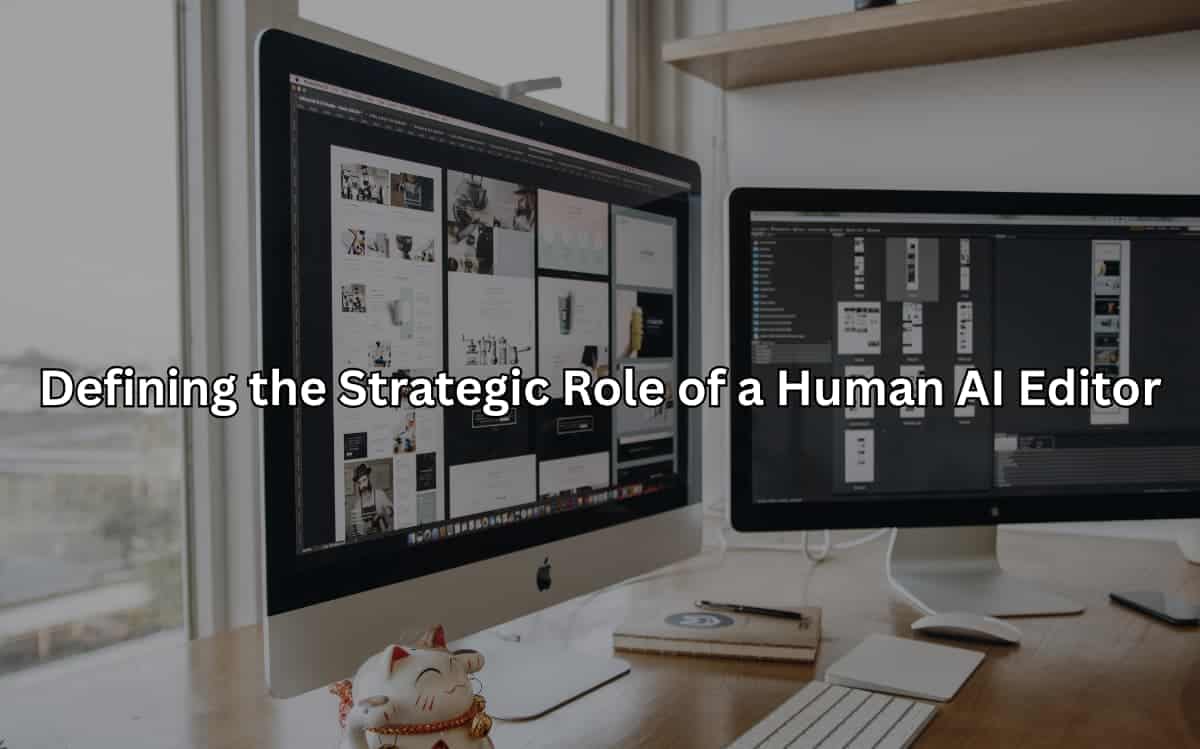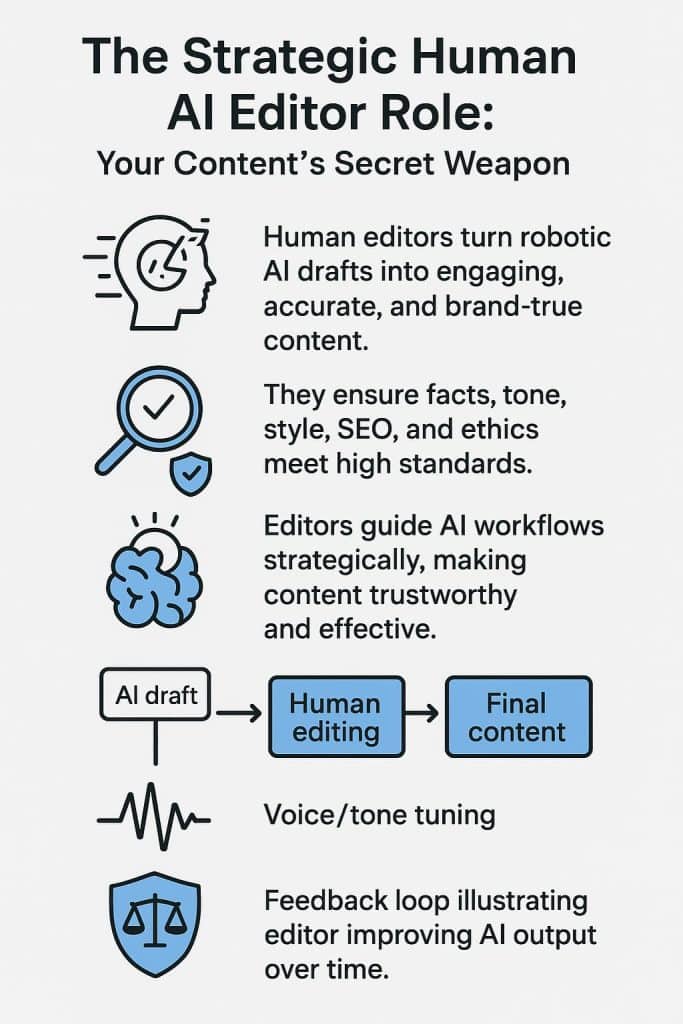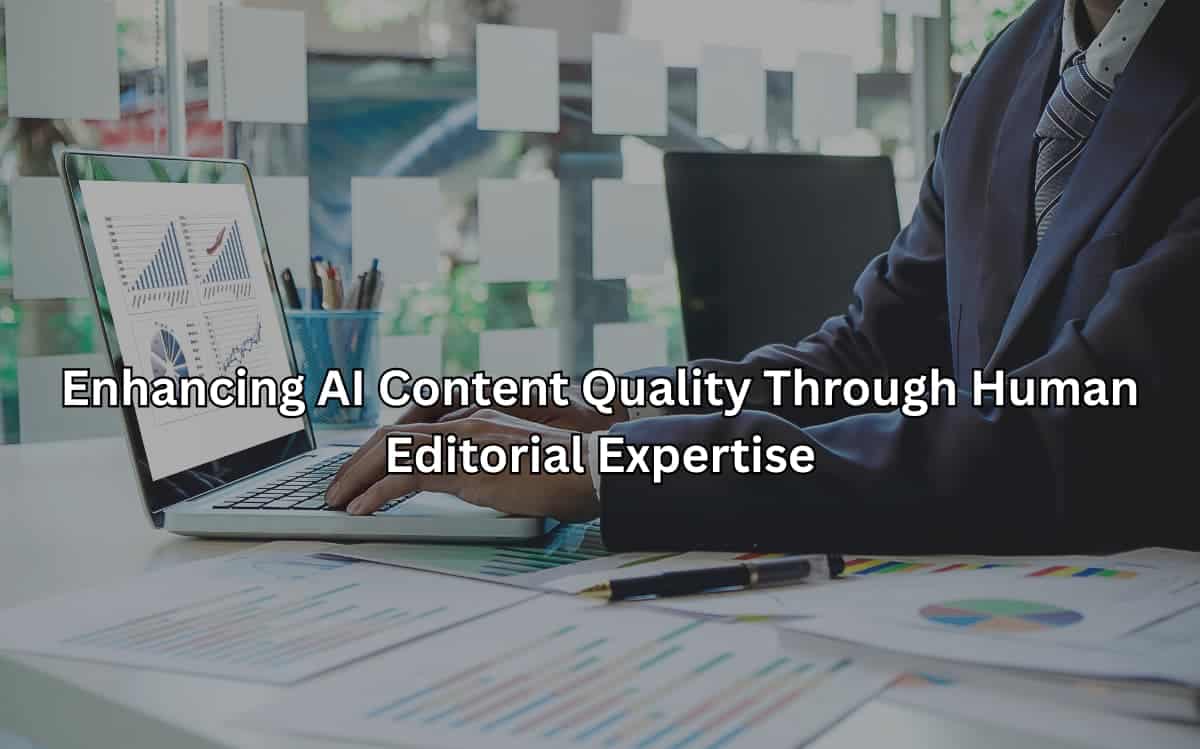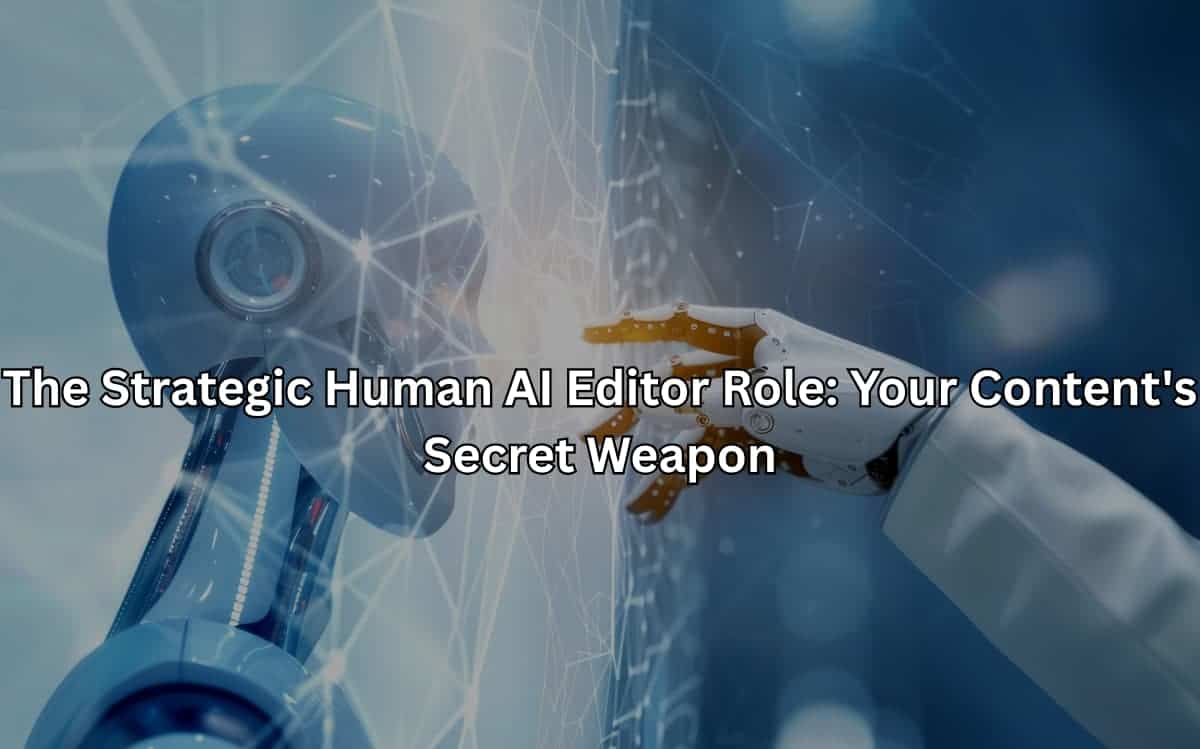A good AI editor sits at their desk, sifting through computer-generated text like a gold miner panning for nuggets. They’re looking for those pieces worth keeping, worth polishing into something people might actually read over their morning coffee. It’s not glamorous work, but it’s necessary – turning robotic writing into words that sound like they came from an actual person.
Think of them as translators who speak both machine and human. [1] They take the raw output (sometimes clunky, often repetitive) and reshape it into something that doesn’t make readers cringe. Because let’s face it, nobody wants to read content that sounds like it came from a robot’s first draft. To see how crucial this role can upgrade your own content, read on.
Key Takeaways
- The Human Touch: These editors blend AI’s speed with actual human judgment – the kind of common sense and creativity that machines just don’t have yet. They’re turning rough drafts into something worth reading.
- Brand Protection: They’re the last set of eyes checking facts, tone, and style before anything goes public. Someone’s got to make sure the content doesn’t sound like it was written by a committee of computers.
- Strategy First: These aren’t just grammar nerds with red pens. They’re thinking about what actually works – what real people want to read and share, not just what algorithms think is important.
Defining the Strategic Role of a Human AI Editor

Working with AI writing tools feels a bit like teaching a brilliant but socially awkward intern. Sure, they can hammer out content at lightning speed, but something’s always a little off. The words are there, but the music isn’t quite right.
That’s where human editors come in. They’re not just fixing grammar – they’re adding the subtle touches that make readers nod along instead of clicking away. Like knowing when to drop in a “probably” or admitting that retirement planning isn’t always as simple as following a checklist.
Bridging AI Content with Human Quality Standards
Picture AI as a fast-talking intern who’s memorized every textbook but never actually sat down with a client. It’ll give you the facts, but it doesn’t know how to read the room. A good editor takes that enthusiasm and channels it into something people actually want to read over their lunch break.
Last month, we got an AI draft about retirement planning that read like a Wikipedia article had a baby with a motivational poster. The facts were solid, but it was about as engaging as watching paint dry. Our editor (who’s spent 15 years in financial writing) rewrote it to sound like advice from someone who’s actually helped real people plan their futures.
She added those small details that make all the difference – mentioning how people often forget about inflation when planning, or why some folks put off saving because they’re worried about looking stupid asking questions. The final version wasn’t just accurate – it was something you’d actually want to forward to a friend who’s stressing about their 401(k).
Making Content Actually Work
Credits: HR University
Let’s be honest – computers write like computers. Even the best AI churns out stuff that sounds like it came from a particularly enthusiastic spreadsheet. [2] Here’s what real editors do to fix that:
- Making Sense. They’ll take those twisted, wordy sentences and turn them into something your neighbor could understand. No more corporate speak or robot rambling.
- Getting it Right. Ever caught your uncle sharing fake news on Facebook? That’s what happens when nobody fact-checks. Our editors dig through the details because wrong numbers and made-up stats don’t help anyone.
- Keeping it Real. They add those small touches that make you want to keep reading – maybe a joke that doesn’t feel forced, or an example that hits close to home.
What These Editors Really Do All Day
Think of them as the people who translate computer-speak into human. They’re not just fixing grammar – they’re making sure the writing actually makes sense to real people.
Fixing the Weird Stuff AI Says
We’ve all seen those AI chatbots that sound almost human until they say something completely off the wall. Our editors catch things like:
- Shop Talk: When AI tries to sound professional but uses industry terms all wrong
- Awkward Moments: Those times when a word is technically right but feels weird (like calling a pet “the domestic animal”)
- Missing the Mark: When AI uses examples that don’t connect with real people (like explaining snow to someone in Miami)
Making Sure Everything’s Actually True by Fact Checking
AI sometimes makes stuff up. Not on purpose, but it’ll confidently write about things that never happened or quote statistics from thin air.
Our editors don’t take anything at face value. They dig through trusted sources, check recent data, and sometimes make a few phone calls to get things right. It’s kind of like being a detective, except instead of solving crimes, they’re making sure nobody’s publishing fake news by accident.
Getting Your Brand’s Voice Just Right
Every company has its own way of talking. Some are casual and funny, others are more buttoned-up. AI tries to match these styles but often ends up sounding like a kid wearing their parent’s clothes – it just doesn’t quite fit.
Our editors know the difference between actually funny and trying-too-hard funny, between professional and just plain stuffy. They tweak and adjust until the writing sounds like it came from a real person at your company, not a computer pretending to be one.
SEO and Content Structure Optimization
Sure, AI is pretty good at placing keywords. But modern SEO is about so much more than that. Our human editors think strategically about the person behind the search query. What questions are they really trying to answer?
We then structure the article with a logical flow, using clear headings and scannable lists that respect the reader’s time. This includes adding genuinely helpful internal and external links, creating a better user experience that search engines are built to reward.
The role of humans as AI evolves is absolutely critical for this layer of strategic thinking.
Ethical and Cultural Sensitivity Oversight
An AI model learns from the vast, messy, and often biased information on the internet. As a result, it can unintentionally produce content that contains:
- Subtle (or overt) biases.
- Outdated stereotypes.
- Culturally insensitive phrasing.
A human editor provides an essential ethical filter. They review every piece to ensure it is inclusive, respectful, and appropriate, protecting your brand from embarrassing and potentially harmful mistakes.
Providing Feedback for AI Model Improvement
Think of the relationship between our editors and our AI tools as a partnership. When an editor refines an AI draft, they aren’t just fixing a single article.
The corrections and adjustments they make serve as feedback, helping the AI models we use get smarter and more accurate over time. It’s a continuous improvement cycle where human expertise makes the technology better, which in turn makes our entire content engine more effective.
Guiding AI Content Workflow and Strategic Oversight
The editor’s job doesn’t start when the AI finishes writing. It starts with the strategy. Our editors are project leads who guide the content process from the beginning, helping to shape the initial AI prompt, reviewing the output, and overseeing the piece until it’s ready for the world.
This strategic oversight ensures every article doesn’t just fill a slot on the content calendar but actively works toward achieving larger business goals.
Strategic Importance of Human AI Editors in Content Production

Bringing a human AI editor into your workflow isn’t just about quality control, it’s a core strategic decision. Their involvement ensures your content is not only scalable but also trustworthy, effective, and built to last.
Augmenting AI Strengths with Human Judgment and Creativity
AI is a workhorse, brilliant at processing information and generating text at scale. But it lacks creativity, common sense, and true critical thinking. A human editor brings these irreplaceable skills to the table.
- A Fresh Angle: An editor can find a unique perspective on a tired topic or craft a story that makes a point more powerfully than a list of facts ever could.
- Logical Reasoning: They can spot a flawed argument or a weak conclusion, ensuring the entire piece is coherent and persuasive.
- Business Acumen: They understand the “why” behind the content and can shape it to achieve specific business goals, like generating leads or building brand authority.
Building Reader Trust through Human Editorial Involvement
In a world drowning in content, trust is everything. Readers are getting better at spotting lazy, purely AI-generated articles. The knowledge that a piece of content has been carefully reviewed by a human expert acts as a stamp of quality. It shows that your brand cares enough to invest in accuracy and value, which is key to building a loyal audience.
Maintaining Content Relevance and Industry Trends
SEO and industry landscapes change fast. An expert human editor stays on top of these shifts. They know what topics are trending, what recent developments are important, and what competitors are doing.
This real-time knowledge allows them to guide and update AI-generated content to be timely and relevant in a way a static algorithm can’t. The job outlook for human AI editors is strong precisely because of this need for current, expert knowledge.
Ensuring Compliance with Legal, Ethical, and Brand Standards
In fields like healthcare, law, and finance, content has to meet strict legal and regulatory rules. AI simply can’t be trusted to handle this complexity.
A human editor with expertise in the subject matter is non-negotiable for ensuring compliance. They are also the final guardians of your brand standards, making sure every published piece is perfectly aligned with your company’s values.
Supporting Sustainable AI Content Generation
Relying 100% on AI is a short-term game that often results in a massive library of mediocre content that no one reads. A sustainable strategy requires a human-in-the-loop.
By making human editors a core part of the process, we ensure the content we produce is consistently high-quality, performs well, and contributes positively to a brand’s long-term success.
Enhancing AI Content Quality Through Human Editorial Expertise

The final polish from a human editor is what turns AI-generated text into a truly great piece of content. This transformation happens across several key areas.
Improving Readability, Coherence, and Flow
AI can write a correct sentence, but it often struggles to string them together into a smooth, readable narrative.
Our editors focus on the rhythm of the language. They break up dense paragraphs, vary sentence lengths, and use clear transitions to guide the reader effortlessly through the article. The goal is a seamless reading experience that holds the user’s attention from start to finish.
Personalizing Content for Target Audiences
Great content feels like it was written just for you. Our editors immerse themselves in the client’s target audience. They learn their pain points, their language, and their goals.
Then, they tailor the AI-generated draft to speak directly to that audience, using examples and a tone that will resonate. This personalization is key to building a real connection.
Detecting and Correcting Bias and Plagiarism
Beyond just being unethical, biased content can alienate huge parts of your potential audience. Human editors are trained to identify and remove subtle biases that AI might miss. They also serve as a crucial check for originality. While AI is designed to create new text, it can sometimes produce phrases that are too close to its training data. Editors ensure every piece is 100% unique.
Managing Tone, Style, and Emotional Resonance
This is where the human touch is most obvious. The ability to control tone and create an emotional connection is what separates functional writing from memorable writing.
An editor can deliberately shape a piece to be inspiring, empathetic, authoritative, or even funny. This emotional layer is what makes your message stick, and the future of human AI content editors will be defined by their mastery of this skill.
Frequently Asked Questions
What does a human AI editor do?
A human AI editor takes writing from a computer and makes it much better. They check that all the facts are correct and fix any confusing sentences. They also add personality and make sure the writing sounds natural and trustworthy, so it’s easy for people to read and understand.
Why not just use AI content by itself?
AI is smart but can still make mistakes or sound like a robot. A human editor is a quality check. They catch errors, remove weird phrasing, and ensure the information is accurate. This makes the final article trustworthy and more enjoyable to read, which is important for building a good reputation.
Is an AI editor just a proofreader?
No, it’s a much bigger job. A proofreader mainly fixes small spelling and grammar mistakes. A human AI editor also checks all the facts, improves the overall flow of the article, and makes sure the tone is right. They think about the big picture to make the content truly great.
Does the editor need to be an expert on the topic?
Yes, it helps a lot! An editor who is an expert in the subject can easily spot when the AI gets something wrong. They know the special words and ideas for that topic. This expertise helps them make the writing much more accurate and helpful for readers who know the subject.
Will AI get good enough to not need human editors?
Probably not. AI is a great tool, but it doesn’t have real creativity, feelings, or common sense. A human is needed to add a personal touch, understand what readers really want, and catch tricky errors. The partnership between a person and AI is what creates the best content.
Human Insight: The Core of Your AI Strategy
At the end of the day, a human AI editor isn’t just a safety net; they are a strategic partner. They are the ones who ensure technology serves a purpose. By blending AI’s power with human creativity, critical judgment, and empathy, this role makes sure your content isn’t just algorithmically optimized, but genuinely human. It’s this combination that unlocks the real power of AI for content creation.
Ready to see how our human-edited, AI-powered content can work for you? Let’s talk.
References
- https://www.forbes.com/councils/forbesagencycouncil/2023/11/14/the-new-content-marketing-paradigm-ai-human-collaboration/
- https://writer.com/blog/editorial-skills-and-ai/
Related Articles
- https://jetdigitalpro.com/future-of-human-ai-content-editors/
- https://jetdigitalpro.com/job-outlook-for-human-ai-editors/
- https://jetdigitalpro.com/role-of-humans-as-ai-evolves/

